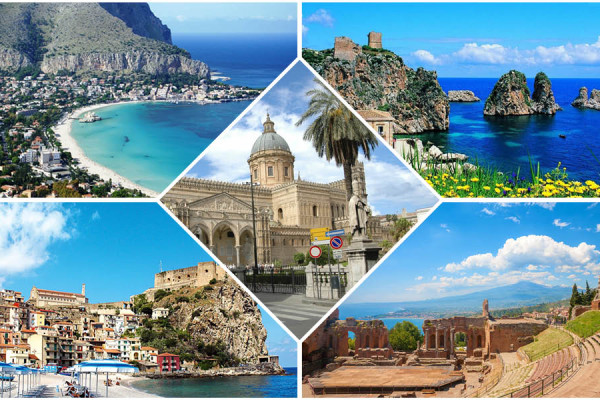ABOUT SICILY
ABOUT SICILY
Sicily [Sicilia] is a beautiful island –the biggest in the Mediterranean Sea- on the southern tip of Italy and along with its surrounding minor islands, it constitutes one of the twenty autonomous regions of Italy. It is separated from the mainland Italy by the 5 km Straits of Messina.
Sicily, the enchanting land where Archimedes taught and Saint Paul preached, was a Greek colony, a Phoenician city, a Roman province, a Byzantine area, an Arab emirate and a Norman kingdom. All of the ancient populations made, during the course of time, this unique island their own, leaving behind an eclectic culture that is still visible today. Habitants and visitors can experience Sicily’s eternal legacy in Phoenician settlements, Punic cities, Greek amphitheatres, Roman temples, Norman castles, Arab forts and Aragonese churches, while the thirty centuries of history is expressed in Classical, Romanesque, Ottoman, Byzantine, Gothic, Renaissance, Rococo, Baroque and many more monuments.
NATURE
Sicily is the place where the mountains meet the sea. Sicily is home to heavenly beaches, majestic mountains and Europe's greatest natural wonder, Mount Etna. Each of its scenic regions offers something different. In the northeast, in the Nebrodi Mountains you'll find unexpectedly lush forests. In the central regions you'll encounter rugged land and rolling hills. Dignified vineyards, ancient olive groves, hardy almond orchards and endless wheat fields complete the Sicilian landscape.
LANGUAGE
Natives of Sicily speak Sicilian, an ancient Roman dialect that is a separate language from Italian. About 30% of the Sicilian vocabulary originates from the Arabic language.
Most Sicilians are proficient in Italian, and modern schools teach English to students. Be advised that when traveling to small villages, some of the older residents may not speak Italian, although some may understand it.
CUISINE
The food is typically Mediterranean but there are strong hints of Arabic and Spanish flavours. As one can imagine, Sicilian cuisine, making the most of its island coasts, has a lot of fish and unlike the northern parts of Italy, cream and butter are hardly used for cooking; instead, the natives usually substitute these with tomatoes or olive oil. A unique Sicilian type of olive tree grows here, which the natives affectionately call the "saracena". Sicilians also like spices and have particular affinity for almond, jasmine, rosemary, mint and basil.
Sicilians notoriously have a sweet tooth and are among the best dessert-makers in Italy. Try 'cannoli' (tubular pastries filled with sweet ricotta cheese), 'granita' (ices mixed with real crushed fruit and juices), and their most famous export, 'cassata' (Arabic-inspired cake).
'Arancini' (sometimes Arancine), fried rice balls with fillings, is a Sicilian fast food that is relatively cheap.
As for the drinks, Sicilians enjoy a fruity lemon liqueur called Limoncello. Sicilians are not big alcohol drinkers (Sicily has the lowest rate of alcoholism in all of Italy) despite the fact that the island is home to more vineyards than any other Italian region and has one of Italy's most progressive wine industries. Best known Sicilian wines: Nero d'Avola, Bianco d'Alcamo, Malvasia, Passito di Pantelleria, Cerasuolo di Vittoria, Etna Rosso, Etna Bianco.

